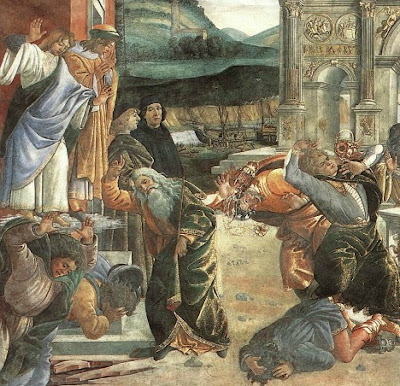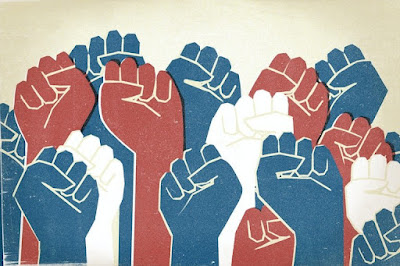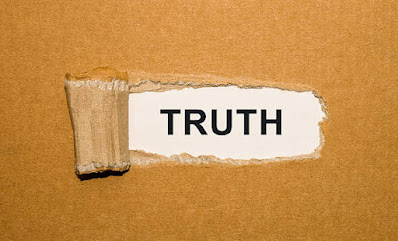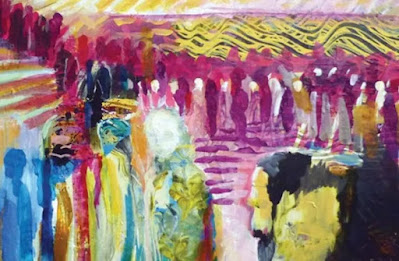Last Shabbos, Korach: Rabba Kaya Stern-Kaufman joined Temple Israel of Portsmouth, New Hampshire (see last May's Portsmouth Parking & The Jews) as spiritual leader in July 2020.
She is dedicated to the development of meaningful Jewish community rooted in our Jewish wisdom traditions and inspired by the contemporary call for tikkun olam — repairing the world.
Abq Jew recognizes that this is in complete violation of an entire plethora of US copyright laws, UN resolutions, and international conventions. But this is important, and Abq Jew agrees with just about everything Rabba Kaya says.
An Attempted Coup
A Water from the Well blog post, Parashat Korach
Written by Rabba Kaya Stern-Kaufman
In this week’s Torah portion a man named Korach, from the tribe of Levi, a first cousin to Aaron and Moses, leads a rebellion against their authority and rouses 250 men to join him. Korach challenges Aaron and Moses, saying,
“You take too much upon yourself, seeing all the congregation are holy, every one of them, and the Lord is among them. The whole community is holy — all of them! Why do you, Moses and Aaron, raise yourselves above them?” (Num. 16: 1-3.)
Korach, whose name means “frozen,” suggests here that since everyone is holy, he is just as fit to lead the Israelites as his cousins, Aaron and Moses. To understand this challenge a little better we need to understand what Korach means by being holy and what God intends for the people when they are told they are to be a holy nation.
At the very end of last week’s portion, just before we are introduced to Korach, Moses relates to the Israelites the mitzvah of wearing Tzitzit. This section is selected for the third paragraph of the Sh’ma. It says the following:
And the Lord spoke to Moses, saying,
Speak to the people of Israel, and tell them that to make fringes at the corners of their garments throughout their generations, and to put within the fringe a thread of blue; …that you may look upon it, and remember all the commandments of the Lord, and do them; …That you may remember, and do all my commandments, and be holy to your God. (Num. 15: 37-40)
By claiming “aren’t we all holy?” Korach twists the meaning of the verse in order to challenge the selection of Aaron as the High Priest. The high priest wears a golden head band on which is engraved the words: Holy unto God. He has been set apart from the people for holy service and the entire garment and headdress he wears indicates this.
The Israelites, on the other hand, wear Tzizit- to remind them and us to aspire to holiness. As it says in the Torah:
“And you shall wear fringes, to see them, that you may remember my mitzvot, and do them all and then become holy to your God.” (Num. 15:39-40)
In other words, we are not holy because we are chosen. We must work at it. Holiness is a perpetual aspiration, not an established fact. It is achieved by living an ethical life based on mitzvot. According to Korach, holiness is like a prize. It is static and given to the people as a birthright. But this is frozen thinking.
Democracy, like holiness, is aspirational.
America is in a 200-year process (some say experiment) with a goal to give freedom and dignity to all people. A totalitarian government, on the other hand, is not interested in this. It is interested instead in enriching those in power and maintaining power at the cost of the liberty of all others.
The United States Constitution gives us the aspirations for creating the conditions for life, liberty and the pursuit of happiness for every individual. And yet today, it appears that our liberties, our safety, and our constitution itself are threatened.
In our Torah portion, Korach speaks from pure self-interest, entitlement and self-indulgence. He uses rhetoric to reverse and subvert God’s intention. Saying “aren’t all the people holy?” he justifies a power grab for himself in the name of “equality.”
This archetypal story of a man who cannot accept the fact that he has NOT been chosen for leadership, but intends to take it by force, echoes today.
twisted rhetoric that subverts truth.
What Torah shows us is that pure self-interest can be dressed up in the language of liberty and freedom, but it cannot lead anywhere except to sink the entire ship. It is ungrounded and cannot support community.
In our narrative, the ground literally opens her mouth and swallows Korach and his family. The other 250 rebels are consumed in a fire.
This catastrophe, however, is not the end of the story of Korach and his lineage. Within the longer biblical narrative of our people, the line of Korach will emerge in the future as the finest musicians of the First Temple days- the B’nei Korach. In the book of Psalms we see 24 psalms attributed to the Sons of Korach.
They are love songs of devotion to God, of seeking and longing for God, of finding the Divine in even the darkest places. They speak as witnesses to the existence of the beauty and power of the Divine that emerges even from the darkness.
What can we learn from this outcome? What is our tradition trying to teach us here about holiness and about redemption?
Arthur Waskow points out that true holiness is like a seed, for a seed carries potentiality.
Holiness is not an end in itself or a pre-condition. It is an eternal aspiration. Korach, the frozen one, inevitably returns to the womb of the earth, to thaw and become like a seed from which holiness will sprout forth in future generations.
And so we ask, what is the work that lies before us? As we face the current challenges in our society, let us remember that our democracy was built on holy aspirations.
Democracy, like holiness, is a process.
It is a verb. It is our task to remember, to engage and to strive to fulfill that vision of dignity, liberty, and justice for all. The democratic process requires constant vigilance and engagement.
Engagement means speaking truth, doing all we can to maintain and create true representation by the people in government and voting.
May we find the strength to continue the work
of supporting liberty and justice for all, that is,
bringing holiness into our world.
And may we be aligned with God’s will.
Ken Yehi Ratzon.











No comments:
Post a Comment